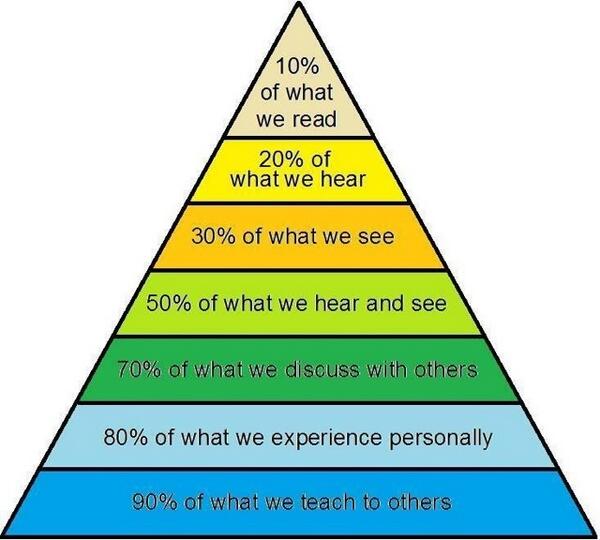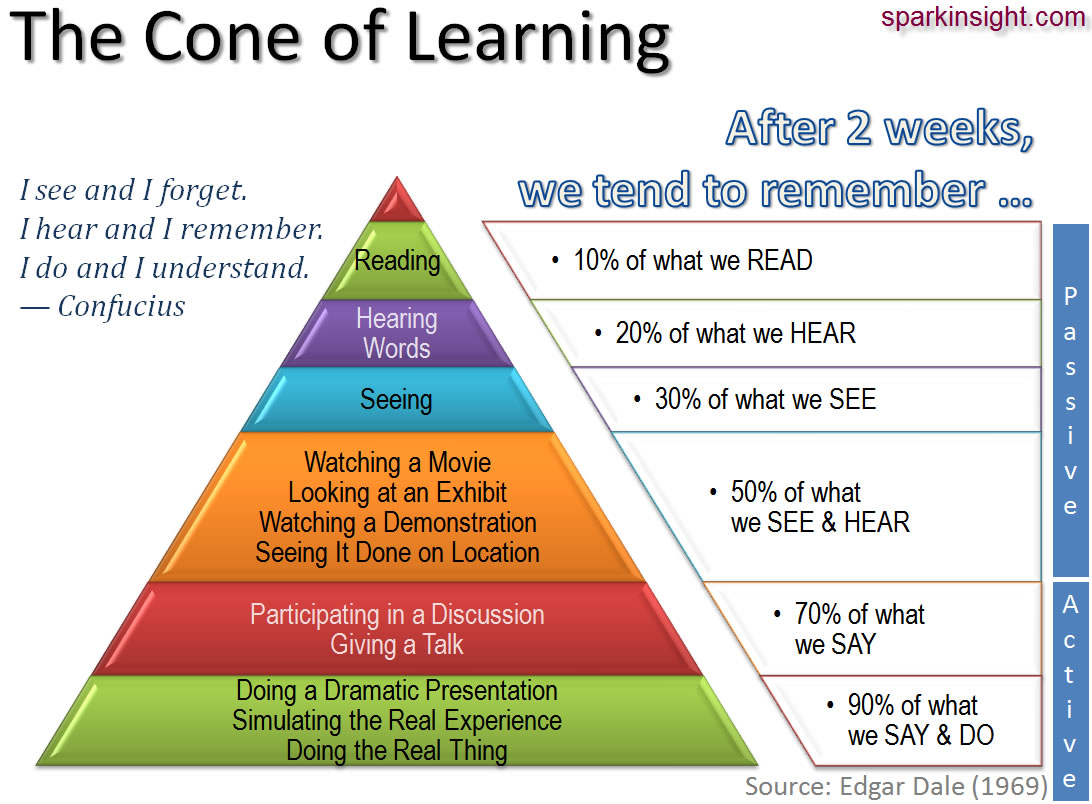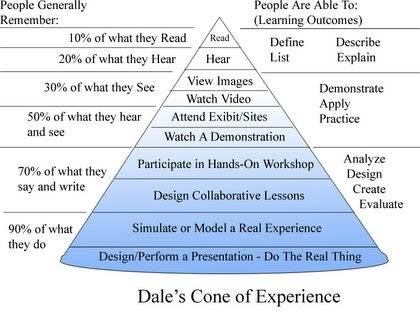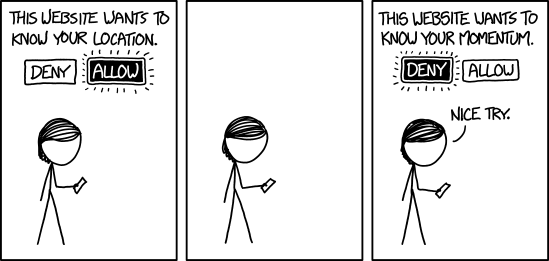Aphorisms
Feynman was a truly great teacher. He prided himself on being able to devise ways to explain even the most profound ideas to beginning students. Once, I said to him, "Dick, explain to me, so that I can understand it, why spin one-half particles obey Fermi-Dirac statistics." Sizing up his audience perfectly, Feynman said, "I'll prepare a freshman lecture on it." But he came back a few days later to say:"I couldn't do it. I couldn't reduce it to the freshman level. That means we don't really understand it." [T11] - Richard Feynman, as quoted in: D.L.Goodstein & J.R.Goodstein (1996) Feynman's Lost Lecture: The Motion of Planets Around the Sun ch.2 p.45
"... if thought is to be aroused and not words acquired ..." [T2] - Dewey (1916) Democracy and Education: An introduction to the philosophy of education ch.12 para.4 (New York, The Macmillan company)
"methods which are permanently successful in formal education ... depend ... upon the fact that they go back to the type of the situation which causes reflection out of school in ordinary life. They give the pupils something to do, not something to learn; and the doing is of such a nature as to demand thinking; learning naturally results." [T11] - John Dewey (1916) Democracy and Education: An Introduction to the Philosophy of Education ch.12 "Thinking in education" p.106
Good quotes, not educational
"Common sense and a sense of humor are the same thing, moving at different speeds. A sense of humor is just common sense, dancing." - Clive James [Quoted by reputable people; but who knows where from, given his endless newspaper columns.]
When a person hears of a new idea, they go through the following responses (often over some years):
- This is worthless nonsense.
- This is an interesting, but perverse, point of view.
- This is true but quite unimportant.
- I have always said so.
See also: more good quotes
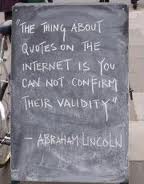 The whole purpose of education is to turn mirrors into windows.
[T10, T333] - Sydney J. Harris
The whole purpose of education is to turn mirrors into windows.
[T10, T333] - Sydney J. Harris I pay the schoolmaster, but it is the school boys who educate my son. [T10, T333] - Ralph Waldo Emerson
The best education consists in immunizing people against systematic attempts at education [T10] - Paul Karl Feyerabend
The most important outcome of education is to help students become independent of formal education. [T10] - Paul E. Gray President of MIT 1980-90
Formal education is but an incident in the lifetime of an individual. Most of us who have given the subject any study have come to realize that education is a continuous process ending only when ambition comes to a halt. [T10] - R.I.Rees. One (this one?) Robert Irwin Rees was a Brigadier General, United States Army; and President (1929-1930) of American Society for Engineering Education.
Whom do I call educated? First, those who manage well the circumstances they encounter day by day. Next, those who are decent and honorable in their intercourse with all men, bearing easily and good naturedly what is offensive in others and being as agreeable and reasonable to their associates as is humanly possible to be... those who hold their pleasures always under control and are not ultimately overcome by their misfortunes... those who are not spoiled by their successes, who do not desert their true selves but hold their ground steadfastly as wise and sober-minded men. [T10] Socrates but unsourced and so dubious
"The things taught in colleges and schools are not an education, but the means of education." [T10] Ralph Waldo Emerson
"He is to be educated because he is a man, and not because he is to make shoes, nails, and pins." [learning for learning's sake, almost.] [T10] William Ellery Channing (1780-1842) U.S. Unitarian clergyman and writer.
Everywhere I go I'm asked if I think the university stifles writers. My opinion is that they don't stifle enough of them. There's many a best-seller that could have been prevented by a good teacher. [T10/T6] Mary Flannery O'Connor (1925-1964) American novelist, short-story writer and essayist.
Education is the ability to listen to almost anything without losing your temper or your self-confidence. [T10] Robert Lee Frost (1874-1963) American poet.
It is the mark of an educated mind to be able to entertain a thought without accepting it. Aristotle
An educated man is one who can entertain a new idea, entertain another person and entertain himself. [T10] Sidney Herbert Wood, (UK) principal assistant secretary of the Ministry of Education in a 1947 talk. Reported in Time magazine Monday, May 19, 1947.
".. if you work hard and intelligently you should be able to detect when a man is talking rot, and that, in my view, is the main, if not the sole, purpose of education." [T10] [it's all critical thinking] John Alexander Smith, Professor of Moral Philosophy, Oxford University, 1914.
"Education is the path from cocky ignorance to miserable uncertainty." [T10] Twain
"Education consists mainly in what we have unlearned." [T10] - Mark Twain's Notebook, 1898
"All Human Knowledge is precious whether or not it serves
the slightest human use." [T10]
A.E. Housman
Education is what remains when we have forgotten all that we have been taught.
[T10] George Savile, Marquis of Halifax (1633-1695) English statesman and
author
Education is what remains after one has forgotten what one has learned in
school. [T10]
Albert Einstein
Education is what survives when what has been learnt has been forgotten.
[T10, T9] B.F. Skinner, US psychologist New Scientist
May 21, 1964
There are obviously two educations. One should teach us how to make a living
and the other how to live. [T10]
James Truslow Adams (historian, freelance author, Pulitzer prize
winner) in "To 'Be' or to 'Do': A Note on American Education" June, 1929
Forum.
"If you travel with us you will have to learn things you do not want to learn
in ways you do not want to learn". [T10]
[Doris Lessing, from a letter replying
to a reader who had been seriously disturbed by reading one of her novels.
Quoted in Alan Yentob's "Imagine" TV programme on Doris Lessing, broadcast
Tues 27 May 2008, 10:35pm on BBC1]
"He who learns must suffer. And even in our sleep pain, which cannot forget,
falls drop by drop upon the heart, until, in our own despite, against our will,
comes wisdom through the awful grace of God." [T10]
Alternatively:
"Zeus, who guided mortals to be wise, has established his fixed law -- wisdom
comes through suffering. Trouble, with its memories of pain, drips in our
hearts as we try to sleep, so men against their will learn to practice
moderation. Favours come to us from gods seated on their solemn thrones -- such
grace is harsh and violent.
This is about revenge vs. justice, rather than wisdom or learning
in general.
[I. 179] Agememnon (first play in the Oresteia 458 BC); Aeschylus (525 - 426 BC)
"To escape boredom and avoid effort are incompatible" [T10]
T.W.Adorno (1941)
"On popular music"
Studies in Philosophy and Social Science
(New York: Institute of Social Research) 1941, IX, 17-48.
"Reading maketh a full man, conference a ready man, and writing an exact man."
[T10, T333]
Francis Bacon (1625) "Of studies" in Essays. See
here
and here for copies of Bacon's 1625 essay; and
here
for Samuel Johnson's 1753 follow-up.
"Everyone who is incapable of learning has taken to teaching" [T1] Oscar Wilde in The Decay of Lying (1891), from Vivan's second speech
"He who can, does. He who cannot, teaches." [T1]
(Misquoted as: "Those who can, do; those who can't, teach.")
George Bernard Shaw (1856-1950) in
Man and Superman (1903 / 1930) p.230.
It is maxim 36, in subsection
"Education", in "Maxims for Revolutionists", which is part of "The
revolutionist's handbook and pocket companion", which is a kind of appendix to
the text of the 4-act play.
"I like to teach: it's easier than learning." [T1]
A character says this in John Updike's (1968) Couples
However still easier than teaching, is just to do the task for the learner.
Which is what teachers are continually tempted into.
"Those who can, do.
Those who can't, teach.
Those who can't teach, teach teachers.
Those who can't teach teachers, go into politics." [T1]
Muriel Barbery in The elegance of the hedgehog (2006)
However
"Those who can, do. Those who understand, teach." [T1]
Or in full:
"With Aristotle we declare that the ultimate test of understanding rests on
one's ability to transform one's knowledge into teaching. Those who can, do.
Those who understand, teach."
Shulman, Lee S. (1986) "Those who understand:
knowledge growth in teaching." Educational Researcher
vol.15 no.2 pp.4-14
"Learning results from what the student does and thinks and only from what the student does and thinks. The teacher can advance learning only by influencing what the student does to learn." [T2]
This was published (as the epigraph at the start of ch.1) in/by: How Learning Works: Seven Research-Based Principles for Smart Teaching by Susan A. Ambrose, Michael W. Bridges, Michele DiPietro, Marsha C. Lovett, Marie K. Norman (2010) (Jossey-Bass); who attribute it to oral personal communications by Herb Simon; who, they say, was paraphrasing Elliott Dunlap Smith. No source for the last is given, nor so far found by me.
"I cannot teach anybody anything, I can only make them think." [T2] Socrates but unsourced and dubious.
Education is an admirable thing, but it is well to remember from time to time that nothing that is worth knowing can be taught. [T2] Oscar Wilde The critic as artist p.248
The greatest sign of success for a teacher ... is to be able to say, "The children are now working as if I did not exist." [T2] Maria Montessori
Children have to be educated, but they have also to be left to educate themselves. [T2] Abbe Dimnet Art of Thinking 1928
There were two small boys, John and Jim, who were friends. Jim had a dog. One
day they were taking the dog for a walk and Jim said proudly: "I've
taught the dog to whistle". "What do you mean?", said John, "He's not
whistling". "I know", said Jim, "But I said I'd taught him; I didn't say he'd
learned". [T2]
Green-Armytage, P. (2002) "Colour Zones -- Connecting colour order and everyday
language" 9th Congress of the International Colour Association, Proceedings
of SPIE Vol. 4421 pp.976-979
"The power of instruction is seldom of much efficacy except in those happy dispositions where it is almost superfluous." [T2] - Edward Gibbon (1776) The decline and fall of the Roman empire vol.1 ch.4
I am always ready to learn although I do not always like being taught. [T2]Winston Churchill
"Education is not filling a bucket, but lighting a fire" Wrongly attributed to W.B.Yeats; but a snappy modern phrasing of ...
"The mind is not a vessel to be filled, but a fire to be kindled." which is actually a fragment taken out of ...
"We must encourage those lazy ones [audience members], however —
once they have grasped the basic points — to
interconnect everything else on their own, to use memory to guide
original thinking, and to accept what someone else says as a starting point, a
seed to be nourished and grown. For the correct analogy for the mind is not a
vessel that needs filling, but wood that needs igniting — no more —
and then it motivates one towards originality and instills the desire for
truth. Suppose someone were to go and ask his neighbors for fire and find a
substantial blaze there, and just stay there continually warming himself:
that is no different from someone who goes to someone else to get some of
his rationality, and fails to realize that he ought to ignite his innate flame,
his own intellect, but is happy to sit entranced by the lecture, and the
words trigger only associative thinking and bring, as it were, only a flush
to his cheeks and a glow to his limbs; but he has not dispelled or dispersed,
in the warm light of philosophy, the internal dank gloom of his mind."
[T2,T10]
On listening [This essay is entirely about students listening to
lectures]
Plutarch (AD46-120)
Penguin translation by Robin Waterfield (1992) (Penguin books).
The above quote is the whole of the second to last paragraph of the essay,
p.50. Section 18; ref. is also 48C-48D.
Some of the misquotations involved are
traced here.
Confucius said: "I am a transmitter, rather than an original thinker. I trust and enjoy the teachings of the ancients. In my heart I compare myself to old Peng." [! T2]Confucius
"Not having learned it is not as good as having learned it; having learned it is not as good as having seen it carried out; having seen it is not as good as understanding it; understanding is not as good as doing it. The development of scholarship is to the extreme of doing it, and that is its end and goal. He who carries it out, knows it thoroughly."
and
"Therefore, he who has heard of it but has not seen it, will certainly err, even though he be widely learned. He who has seen it but does not understand it, will certainly be led astray, even though he has memorized it. He who understands but does not carry it out will certainly stumble, even though he regard it as important. If a man has not learned it nor seen it carried out, although his actions should be correct, he would not be benevolent (Jen); every hundred of his actions would only be a hundred failures." [T2] Xun-zi (312-230 B.C.). My source
You can teach a student a lesson for a day; but if you can teach him to learn by creating curiosity, he will continue the learning process as long as he lives. [T22?] [but how non-applicable to imagine a) that you can create curiosity about anything anytime; b) that a student is well-equipped if they can only learn when curious, not when it is useful to them or required by others] Clay P. Bedford [? a top executive of Kaiser Industries in California, died 1991]
"Knowledge which is acquired under compulsion obtains no hold on the mind." Plato, from The Republic [T22]
Spoon feeding in the long run teaches us nothing but the shape of the spoon. [T22] E.M.Forster from a radio talk.
Wendy: "Max, I am just too stupid to learn." Max: "No Wendy, I am too stupid to teach." [T2,22,222] Wendy, and Max Clowes.
Education is one of the chief obstacles to intelligence and freedom of thought [T3, (T6)] Bertrand A. Russell
Education makes us more stupid than the brutes. A thousand voices call to us on every hand, but our ears are stopped with wisdom. [T3] - Jean Giraudoux
Learning: the kind of ignorance distinguishing the studious. [T3] Ambrose Bierce The Devil's Dictionary
"I have never let my schooling interfere with my education." [T3]
- This quote has been attributed to Mark Twain, but until the
attribution can be verified, the quote should not be regarded as authentic.
"Don't let school interfere with your education" [T3]
"Never let formal education get in the way of your learning." [T3]
[may be the accurate one.]
My grandmother wanted me to have an education, so she kept me out of school. [T3] Margaret Mead
"A little learning is a dangerous thing; drink deep, or taste not the Pierian
spring: there shallow draughts intoxicate the brain, and drinking largely
sobers us again." [T3]
Alexander Pope (1688-1744) in An Essay on Criticism (1709)
"... but a little learning is by no means a dangerous thing in good company;
on the contrary, it will do very well." [T3]
Jane Austen in Persuasion (1818) ch.16.
(However this excerpt is put into the mouth of a bad man.)
"'Only I was afraid you would be getting so learned', said Celia, regarding
Mr. Casaubon's learning as a kind of damp which might in due time saturate a
neighbouring body."
[T3]
George Eliot in ch.28 of Middlemarch (1871)
For as the Greek verse says: 'To what use serves learning, if understanding be away.' [T3] Apud Stobaeus, tit. iii., p. 37 (1609); quoted in Montaigne On pedantry On pedantry
I do not approve of anything that tampers with natural ignorance. Ignorance
is like a delicate exotic fruit; touch it and the bloom is gone. The whole
theory of modern education is radically unsound. Fortunately in England, at
any rate, education produces no effect whatsoever. If it did, it would prove
a serious danger to the upper classes, and probably lead to acts of violence
in Grosvenor Square. [T3]
Wilde,Oscar The importance of being earnest
"He who learns without thinking will be bewildered; he who thinks without learning will be in danger." [T3] - Confucius
All intellectual improvement arises from leisure. [T3, T8] Samuel Johnson in Boswell (1799): Life of Johnson [N.B. Johnson is using this as an argument for social inequality]
"Knowledge is good, method is good, but one thing beyond all others is
necessary; and that is to have a head, not a pumpkin, on your shoulders, and
brains, not pudding, in your head." [T33]
A.E. Housman
No one wants a good education. Everyone wants a good degree. [T33] - Lee Rudolph
The Master said, "In ancient times, men learned with a view to their own improvement. Nowadays, men learn with a view to the approbation of others." [T33] - Confucius [This shows that an imaginary nostalgia for deep over shallow learning, or at least for intrinsic over extrinsic motivation, for learning was present even in ancient times.]
Education is a state-controlled manufactury of echoes. [T33] Norman Douglas, (probably the English author, died 1952)
He who joyfully marches to music in rank and file has already earned my contempt. He has been given a large brain by mistake, since for him the spinal cord would suffice. [T33/T6] Einstein
Do we really recommend learning from your errors?
Here's a quote from an experimental astrophysicist as his team slaves away getting their balloon-borne telescope ready for launch:
"Step by tedious step, we stumble away from abject failure. And that's on a good day." [T4]
Barth Netterfield, in a TV documentary on one of his research projects
"Only a fool learns from his own mistakes. The wise man learns from the mistakes of others." [T4] Otto von Bismarck
If you want to increase your success rate, double your failure rate. [T4] Thomas Watson, Sr., founder of IBM
"For the things we have to learn before we can do them, we learn by doing them." [T4] Hannah Arendt
Mistakes are the portals of discovery. [T4] James Joyce Ulysses
Learning is like raising a monument; if I stop with this basket of earth, it is my own fault. It is like throwing earth on the ground; one basket at a time, yet I advance. [T4] - Confucius
I never make stupid mistakes. Only very, very clever ones. [T4] John Peel, disc jockey
The only thing experience teaches us is that experience teaches us nothing. [T4] Andre Maurois (1885-1967) French biographer and writer
Time is a great teacher, but unfortunately it kills all its pupils [T4] (Louis) Hector Berlioz .
"Poor is the pupil who does not surpass his master." [T5]
Leonardo da Vinci
If the student isn't better than the teacher, then the teacher is a failure.
[T5]
Zen aphorism, quoted by Allen Ginsberg
I am entirely certain that twenty years from now we will look back at education as it is practiced in most schools today and wonder that we could have tolerated anything so primitive. [T5] - John W. Gardner, Secretary of Health, Education, and Welfare under President Lyndon Johnson.
"The plural of anecdote is not data" [T7] Lee Shulman.
"We are heartened by the data (which is the plural form of 'anecdote' in this case) ..." [T7] ???.
"It was imagined that experiments in education were not necessary; and that, whether any thing in it was good or bad, could be judged of by the reason. But this was a great mistake; experience shows very often that results are produced precisely the opposite to those which had been expected. We also see from experiment that one generation cannot work out a complete plan of education." [T7] Immanuel Kant, in his university lectures On Pedagogy
Only dead fish swim with the stream. [T6] Malcolm Muggeridge
No one can possibly achieve any real and lasting success or 'get rich' in business by being a conformist. [T6] [but untrue] John Paul Getty
The imagination imitates. It is the critical spirit that creates. [T6] Oscar Wilde
"The principal goal of education is to create men who are capable of doing new things, not simply of repeating what other generations have done." [T6] Jean Piaget
Thank goodness I was never sent to school; it would have rubbed off some of the originality. [T6] Beatrix Potter (1866-1943) English author, illustrator, mycologist and conservationist.
Education costs money, but then so does ignorance. [T8] - Sir Claus Moser (b. 1922), German-born British academic and statistician, Warden of Wadham College, Oxford. Daily Telegraph (London, 21 Aug. 1990).
If a man empties his purse into his head, no one can take it away
from him. An investment in knowledge always pays the best interest. [T8]
Benjamin Franklin
[N.B. this doesn't say that formal education is the best investment.]
All intellectual improvement arises from leisure. [T3, T8] Samuel Johnson in Boswell (1799): Life of Johnson [N.B. Johnson is using this as an argument for social inequality]
There can be no education without leisure, and without leisure education is worthless. [T8] Sarah Josepha Hale (American writer, author of "Mary had a little lamb", died 1879)
Otium sine litteris mors. (Leisure without learning [is] death) [T8] Seneca (AD 65) Moral Epistle 82
One of the few things a person is willing to pay for and not get. [T8] William Lowe Bryan, 10th president of Indiana University (1902 to 1937).
Education seems to be in America the only commodity of which the customer tries to get as little he can for his money. [T8] Max Leon Forman (1909-1990) Jewish-American writer
We learn simply by the exposure of living. Much that passes for education is not education at all but ritual. The fact is that we are being educated when we know it least. [T9] - David P. Gardner [who is he?]
You know more than you think you know, just as you know less than you want to know. [T9] Oscar Wilde
Education is what survives when what has been learnt has been forgotten. [T10, T9] B.F. Skinner, US psychologist New Scientist May 21, 1964 [i.e. you believe you have forgotten, yet you show permanent changes.]
The fellow who thinks he knows it all is especially annoying to those of us who do. [T9] Harold Coffin, a former humor columnist for The Associated Press, died 1981
Docendo discimus: By teaching, we learn. [T333] Seneca (AD 65) Moral Epistles 1, 7, 8
What is a teacher? I'll tell you: it isn't someone who teaches something, but someone who inspires the student to give of her best in order to discover what she already knows. [T333] - Paulo Coelho, The Witch of Portobello
More important than the curriculum is the question of the methods of teaching and the spirit in which the teaching is given. [T333] Bertrand Russell
"Teaching yourself is discovering what is teachable." [T333]
From:
"For me, the first challenge for computing science is to discover how to
maintain order in a finite, but very large, discrete universe that is
intricately intertwined. And a second, but not less important challenge is
how to mould what you have achieved in solving the first problem, into a
teachable discipline: it does not suffice to hone your own intellect (that
will join you in your grave), you must teach others how to hone theirs.
The more you concentrate on these two challenges, the clearer you will see
that they are only two sides of the same coin: teaching yourself is
discovering what is teachable."
E.W.Dijkstra.
[N.B. This distinguishes implicit and explicit. If it's implicit,
you may have learned it, but can't teach it -- at least in Dijkstra's view of
teaching here.]
The greatest education in the world is watching the masters at work. [T333] - Michael Jackson (the pop star) in Moonwalk, 2009
First figure out why you want the students to learn the subject and what you want them to know, and the method will result more or less by common sense. [T333] - Richard Feynman
"solution to the problem of education":
I think, however, that there isn't any solution to this problem of education
other than to realize that the best teaching can be done only when there is a
direct individual relationship between a student and a good teacher -- a
situation in which the student discusses the ideas, thinks about the things,
and talks about the things. It's impossible to learn very much by simply
sitting in a lecture, or even by simply doing problems that are assigned. [T333]
- Richard Feynman
I learned most, not from those who taught me but from those who talked with me. [T333] - St. Augustine
I pay the schoolmaster, but it is the school boys who educate my son. [T10, T333] - Ralph Waldo Emerson
It appears, therefore, that some development of the capacity to be alone is necessary if the brain is to function at its best, and if the individual is to fulfil his highest potential. Human beings easily become alienated from their own deepest needs and feelings. Learning, thinking, innovation and maintaining contact with one's own inner world are all facilitated by solitude. - Anthony Storr
"By three methods we may learn wisdom: First, by reflection, which is noblest; second, by imitation, which is easiest; and third by experience, which is the bitterest." [T333] - Confucius
I used to sit alone thinking about this and that. Sometimes I even forgot my meals or bedtime. Still I gained very little. Later I shifted to reading omnivorously, but I did not benefit a great deal either. At long last I came to see that reading in a mechanical way without using my brains was no use. On the other hand, if thinking is divorced from the reality and no due attention is paid to reading, one will continue to feel puzzled by many things. One should constantly review what he has learned and combine reading with thinking. In thus making use of the theories one has learned to guide his thought and help analyze the problems at hand, progress will be achieved. [T333] - Confucius
It matters not what you Learn; but when you once learn a thing, you must never give it up until you have mastered it. It matters not what you inquire into; but when you inquire into a thing, you must never give it up until you have thoroughly understood it. It matters not what you try to think out, but when you once try to think out a thing, you must never give it up until you have got what you want. It matters not what you try to sift; but when you once try to sift out a thing, you must never give it up until you have sifted it out clearly and distinctly. It matters not what you try to carry out; but when you once try to carry out a thing, you must never give it up until you have done it thoroughly and well. [T333] - Confucius
"A student should not be taught unless he is anxious to understand what he does not understand, and should not be enlightened unless he is eager to express what he cannot express." [T333] - Confucius. [the recipe for getting learners to recognise a problem.]
"Letting the students admire the excellence of other students ensures the success of education." [T333] - Confucius [My L3 tutorial reciprocal critiquing exercise.]
"Is it not a pleasure to learn and practise from time to time what is learned?" [T333] - Confucius
Correction does much, but encouragement does more. [T333] - Goethe
Those who trust us educate us. [T333] - George Eliot
Nine tenths of education is encouragement. [T333]
- Anatole France
[Cf. Mitra.]
Reviewing what you have learned and learning anew, you are fit to be a teacher. [T222] - Confucius
He can be a teacher who finds what is new in reviewing what is old. [T222] - Confucius
Confucius
Confucius is the Latin form of K'ung-Fu-tze (Master Kong). 550 BC - 478 BC or 551-479 BC in /near Shantung. Contemporary of Buddha; 100 years before Plato.There are five collections of writings by Confucius and his disciples: The analects of Confucius, The great learning, The doctrine of mean, Mencius; The book of change, The book of odes, The book of rites, The book of history, The spring and autumn annals.
